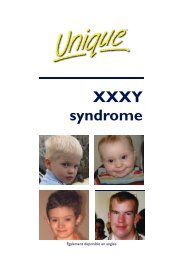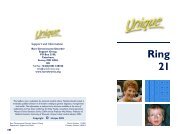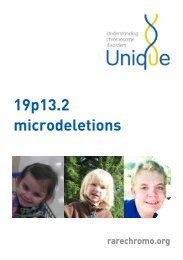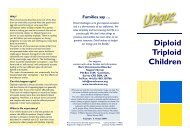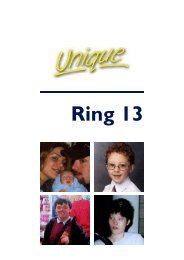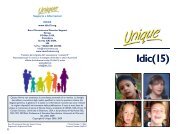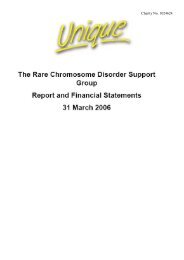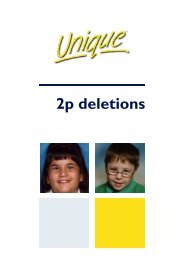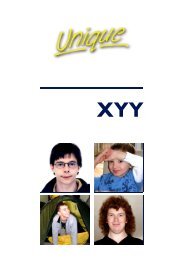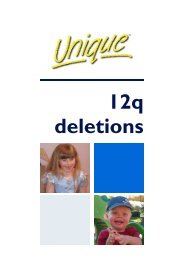16p11.2 microdeletions - Unique - The Rare Chromosome Disorder ...
16p11.2 microdeletions - Unique - The Rare Chromosome Disorder ...
16p11.2 microdeletions - Unique - The Rare Chromosome Disorder ...
Create successful ePaper yourself
Turn your PDF publications into a flip-book with our unique Google optimized e-Paper software.
“ He attends a special school and is in a class with 2 support staff. He always tries very<br />
hard but has problems with reading, writing, maths and IT. If he fails, he is reluctant to<br />
try again. He learns best ‘hands on’ by going on trips, seeing and feeling what the class is<br />
talking about. He can write own name and surname and can draw people, trains, cars etc.<br />
He is learning keyboard skills at school and is good with a mouse - 8 years<br />
“ He goes to a very small public school which offers individual learning and stayed back<br />
one year but has no learning support. His teacher says that his reading and maths are at<br />
grade level and spelling – which he finds especially difficult - is below. As things become<br />
more difficult he will fall further behind but he reads simple books, likes numbers and is<br />
artistic, starting to draw mainly abstract pictures himself. He learns best when it’s made<br />
fun and with a firm and encouraging but not too pushy teaching style - 8½ years<br />
“ She currently has the ability of a 6-year-old. She attends a mainstream junior school<br />
where she finds English especially difficult. She reads simple early years books and<br />
writes neatly but it doesn’t make sense. She loves to write, draw and colour pictures<br />
- almost 10 years<br />
“ He attends an SLD school with mostly 1:1<br />
learning support. He is willing to learn and is<br />
on Stage 1 reading and writing and can write<br />
familiar words such as mom, dad, nan<br />
- 12 years<br />
“ He has mild learning difficulties mild and<br />
is in a supported class at a mainstream<br />
secondary school. He’s good at music but has<br />
more difficulty with English, maths<br />
and science and lacks confidence. His<br />
reading age is 8 years 8 months and he<br />
has a scriber for exams as his writing isn’t<br />
very good - 15 years<br />
Influence on susceptibility to autism or autism spectrum<br />
disorder<br />
<strong>The</strong> typical <strong>16p11.2</strong> microdeletion is found more often among children and adults<br />
diagnosed with autism or a disorder on the autistic spectrum such as Asperger disorder<br />
than among the general population. Yet not everyone with the microdeletion has autism –<br />
perhaps one in three to one in five does. Boys are more likely to be affected and affected<br />
seriously. Seven/26 <strong>Unique</strong> members show autistic features, five of them boys, but only<br />
one has a formal diagnosis of autism.<br />
It is currently believed that having the microdeletion increases the risk of autism but does<br />
not necessarily cause it. <strong>The</strong> underlying suggestion is that a network of genes within the<br />
microdeletion region is disrupted, possibly causing changes in brain development that<br />
may manifest as developmental delay or autism. <strong>The</strong>se genes include genes involved in<br />
cell-to-cell signalling and interaction (Kumar 2008; Marshall 2008; Weiss 2008; Bijlsma<br />
2009; Glessner 2009; Mefford 2009; Shinawi 2009; Fernandez 2010; Decipher; <strong>Unique</strong>).<br />
10



